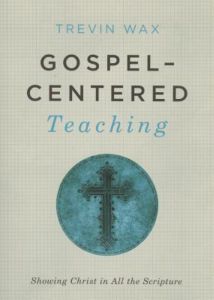Gospel-centeredness is in. It’s cool to be all about the gospel today. In fact, it’s so “in” that we now have to worry about its becoming a mere buzz-word, a cliche with little meaning. Even so, it is surely an indication of God’s blessing among us that our generation has become more gospel-aware.
Still, those who teach must learn what gospel-centered teaching is — and isn’t. And for the most part this effort has been conducted at higher levels — the concern of pastors, theologians, and those with some degree of formal theological training. Fair enough. But pastors who try to keep up with the discussion still must find ways to communicate the same to their own church’s teachers (or group leaders or facilitators or however it is they might be designated). Trevin Wax, editor of The Gospel Project, managing editor of The Gospel Project at LifeWay Christian Resources, has written with just these people in mind — Sunday School teachers, children’s workers, and small-group leaders. His Gospel-Centered Teaching: Showing Christ in All the Scriptures is a delightful resource, easily accessible to and very useful for any who teach at whatever level. It is a helpful tool for use in local churches, guiding teachers very simply to grasp the meaning, the value, and the “how to” of a teaching that can be distinctively Christian. A needed book for laymen who want to improve their effectiveness in local church ministry, we hope it will be distributed generously in many local churches.
Recently we interviewed Trevin about his new work, and we’re pleased to share his insights with our readers.
Books At a Glance (Fred Zaspel):
Many of your remarks in your book reflect some degree of personal acquaintance with small groups, children’s work, Sunday school teaching, and such. Can you tell us something of your experience here?
Wax:
I’ve been teaching Sunday School and leading small groups from the time I was in high school. Children, students, and adults. I’ve also taught in cross-cultural settings (primarily Romania, where I served churches for a period of 5 years). In the past few years, I’ve been involved in the launch of The Gospel Project – a gospel-centered curriculum for all ages that seeks to show how the glory of God in Christ is the focus of the Scriptures.
Books At a Glance:
Concerning your book, let’s begin with first things: What do you mean by gospel-centered teaching? And maybe, what don’t you mean?
Wax:
I don’t mean tacking on a gospel presentation to the end of a lesson or sermon. That’s better than not getting to the gospel at all, but it can give the impression that the gospel is something disconnected from the rest of the Bible study. What I mean by gospel-centered teaching is that we study the Scriptures in light of Christ, that we ground our application in the good news of what Christ has done, and that we see Bible study us for our mission in this world.
 Books At a Glance:
Books At a Glance:
What contribution do you hope to make with your book? And how is this book not just another proffered technique?
Wax:
I hope the book will be accessible and helpful for Sunday School and small group leaders who are not seminary trained, who open the Word each week and want to be faithful, but may lack some of the values and guidelines that would help them give people Christ week after week. The book is not just another technique because the focus is on the message, not the method.
Books At a Glance:
In your book you highlight three common complaints from small group leaders: missional apathy, biblical illiteracy, and dissatisfying Bible study experience. How does an intentional gospel-centeredness answer these problems?
Wax:
I don’t believe that being gospel-centered will answer these problems. Only the Holy Spirit can open our hearts to the truth of God’s Word and awaken our hearts to the reality of our mission. But I do believe that intentional gospel-centeredness can put us in the proper posture before God’s Word, opening us up to the Holy Spirit’s work.
Books At a Glance:
Christians grasp fairly easily that the gospel is the power of God to salvation. But how is the gospel effective for sanctification and Christian growth also?
Wax:
The Apostle Paul speaks of the gospel as the message by which we are being saved, even now in the present. This indicates that though our knowledge may increase (we move beyond basic doctrines into deeper and richer truth, as the author of Hebrews tells us), we are not moving beyond the gospel to other things, but moving deeper into the gospel and its implications for all of life. We need the truth of the gospel to sustain us throughout our Christian life – not just at conversion.
Books At a Glance:
How does a gospel-centeredness answer the respective needs and concerns of teachers and leaders of children’s, youth, and adult groups?
Wax:
For leaders of children’s groups, it keeps us from merely providing the “be nice and obey” message every week. It helps kids understand their place in God’s big plan for the world and how Jesus is the Hero of the story – the One they should run to whenever they sin and need forgiveness. For leaders of youth groups, gospel-centeredness keeps us from merely focusing on the “don’ts” of the Christian life (don’t have sex, do drugs, etc.). For adults, it helps us see the Bible as God’s Word to us – not just a book we skim for practical tidbits of advice but the story of God and His world and His redemption.
Books At a Glance:
Explain what you mean by providing “depth” of teaching. And why so often does even serious, seemingly “in depth” Bible study not prove profitable or transformational?
Wax:
Some think “depth” means giving more information: “Just tell me something I don’t already know.” Others think depth means “applying the Scriptures well.” Gospel-centrality gives us a bigger framework that encompasses both those things. It certainly gives us more information, but it does so in a way that connects the stories of the Bible to the big Story that has Jesus as the centerpiece. It certainly gives us application, but it does so in a way that is grounded not in what we do for Jesus, but what Jesus has done for us. Unless “depth” is somehow connected to Christ’s person and work, we are in Bible study, but not Christian Bible study.
Books At a Glance:
You are not offering just another technique, but still perhaps you can offer some practical advice to teachers and small-group leaders. How can we become more gospel-centered in our teaching? What factors need to be kept in mind? Can you give us a “big picture” answer? And perhaps some practical steps teachers can take more thoroughly to “gospelize” their ministry?
Wax:
Well, that’s what I wrote the book for. 🙂 I can summarize three questions that I think provide a helpful grid for analyzing the content of your lesson. 1. How does this topic/passage fit into the big story of Scripture? 2. What is distinctively Christian about the way I am addressing the topic/passage? (Would this be true if Jesus hadn’t died and been raised?) 3. How does this truth equip God’s church to live on mission?
Books At a Glance:
You warn against mere moralizing, but you also note that Christian teaching still very rightly has a moral and ethical — “application” — dimension. It is a very legitimate use of the Scriptures, for instance, to emphasize the positive and/or negative examples of various biblical characters. What is a gospel-centered way of doing this? What does a gospel-grounded or gospel-shaped application look like? And could you address this specifically in reference to teachers of children also?
Wax:
At times, there is an overreaction against finding examples in the Old Testament, even though Paul tells us that these stories are there for us to learn from (1 Corinthians 10). To ignore the moral and ethical dimensions of Scripture is to miss a major purpose of the biblical authors. Even in the Gospels, it is clear that the authors want us to imitate Christ. The wrong way of going about this is by emphasizing application in a way that is disconnected from Christ’s work on the cross for us. Giving imperatives without grounding them in the indicatives of the gospel is a way to lead to people to despair. I want my kids to learn strategies for battling temptation from the account of Jesus in the wilderness, but even more, I want them to know who to run to when (not if) they succumb to temptation. I’ve heard it put this way before: We must receive Jesus as gift, before we can have Him as example.
Books At a Glance:
You encourage teaching “big” biblical and theological words even to small children — likely the polar opposite of popular opinion! Please explain your thinking in this regard.
Wax:
I believe we should give children “big” words and then explain what they mean. It’s better in the long run if we give our children the language of the Christian faith. I want my kids to pray the Lord’s Prayer long before they understand all the meaning packed into those words. I want them to grow up into those big words. In the same way, I think we shouldn’t be afraid of words like “repentance” or “Mediator.” We should give kids these words and then explain what they mean in ways they can understand.
Books At a Glance:
Finally, how does gospel-centered teaching create and compel a mind-set of intentional gospel mission?
Wax:
The gospel is a story of a God with a missionary heart who sends His missionary Son and now indwells us through His missionary Spirit. There is no gospel-centrality apart from mission. The New Testament does not just present us with a message about the Messiah; it is everywhere connecting that Messiah to His mission (and by extension, ours – John 20). Miss the mission and you’ve missed the point of being gospel-centered. The goal of gospel-centered teaching is that we would have an encounter with Christ through the power of God’s Word, an encounter that leads us to worship and adore Him through a life of showing and sharing the holy love of God manifested through the cross and resurrection of Christ.

